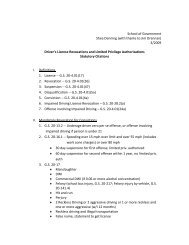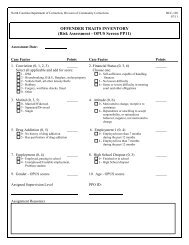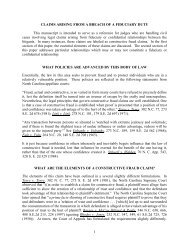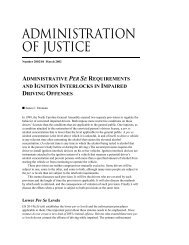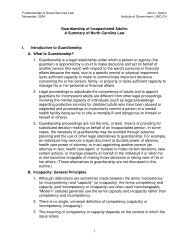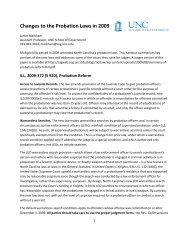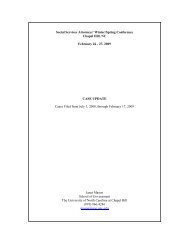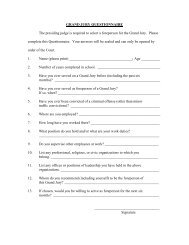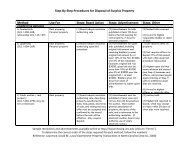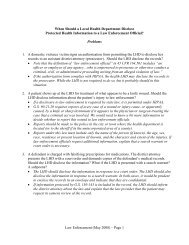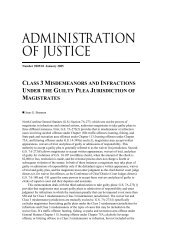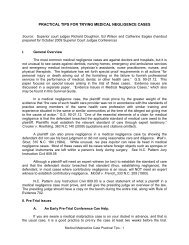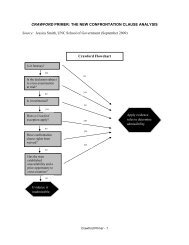res judicata and collateral estoppel - North Carolina Business ...
res judicata and collateral estoppel - North Carolina Business ...
res judicata and collateral estoppel - North Carolina Business ...
You also want an ePaper? Increase the reach of your titles
YUMPU automatically turns print PDFs into web optimized ePapers that Google loves.
RES JUDICATA AND<br />
COLLATERAL ESTOPPEL<br />
“It’s déjà vu all over<br />
again.”<br />
Berra, Yogi
Estoppel by Judgment<br />
<br />
<br />
<br />
<br />
Stability<br />
Finality<br />
Judicial economy<br />
Avoidance of litigation cost
Res Judicata<br />
<br />
<br />
“A thing decided.”<br />
Requirements<br />
Prior final judgment on the merits<br />
Identity of parties/privies<br />
Identity of claim<br />
(See
Collateral Estoppel<br />
<br />
Requirements<br />
Prior final judgment on the merits<br />
Identity of issue<br />
Issue necessary to judgment<br />
Issue actually litigated<br />
Issue actually determined<br />
(See Youse v. Duke Energy Corp., 171<br />
N.C.App. 187, __, 614 S.E.2d 396, 401<br />
(2005).
Applications<br />
<br />
<br />
<br />
<br />
<br />
<br />
Defensive <strong>and</strong> offensive<br />
Criminal <strong>and</strong> civil<br />
Administrative law<br />
Arbitration<br />
Claims <strong>and</strong> defenses<br />
Issues of fact <strong>and</strong> law
Burden of proof<br />
<br />
<br />
General: On party asserting the<br />
judgment as a bar.<br />
Exception: On assertion of<br />
<strong>collateral</strong> <strong>estoppel</strong>, party against<br />
whom asserted has burden of<br />
showing lack of full <strong>and</strong> fair<br />
opportunity to litigate issue.
Final Judgment<br />
<br />
<br />
<br />
<br />
Interlocutory orders<br />
Effect of appeal<br />
Erroneous judgment<br />
Void judgment
On the Merits<br />
<br />
Involuntary dispositions<br />
Rule 12(b)<br />
Personal jurisdiction<br />
Venue<br />
Necessary party<br />
Failure to state a claim
On the Merits (cont’d)<br />
<br />
Involuntary dispositions<br />
Rule 41(a)<br />
Rule 41(b)
Identity of parties<br />
<br />
Privity<br />
“Mutual or successive relationship<br />
to same rights of property.”<br />
“By purchase, succession or<br />
inheritance.”<br />
“o identified in inte<strong>res</strong>t with another that<br />
he rep<strong>res</strong>ents the same legal right.”
Privity (cont’d)<br />
<br />
<br />
Appears as requirement for both<br />
<strong>res</strong> <strong>judicata</strong> <strong>and</strong> <strong>collateral</strong><br />
<strong>estoppel</strong>.<br />
Mutuality<br />
That each party is bound by the<br />
judgment.<br />
Ab<strong>and</strong>oned for <strong>collateral</strong> <strong>estoppel</strong>
Identity of claim<br />
<br />
<br />
<br />
<br />
Facts that entitle party to judicial<br />
remedy.<br />
Not the facts, but the unlawful<br />
violation of a right shown by the<br />
facts.<br />
NC: “a legal wrong threatened or<br />
committed against the complaining<br />
party.”<br />
Policy against claim-splitting.
Identity of claim (cont’d)<br />
<br />
<br />
<br />
Transactional approach (Restatement)<br />
“All rights . . . to remedies against the<br />
defendant with <strong>res</strong>pect to all or any part<br />
of the transaction, or series of connected<br />
transactions, out of which the action<br />
arose.”<br />
Not adopted in NC<br />
But, applying different labels to a claim or<br />
defense does not, alone, render them<br />
distinct.<br />
Nor does a difference in the remedy<br />
sought.<br />
Nor does reliance on different evidence.
Identity of issue<br />
<br />
<br />
<br />
<br />
Actually litigated<br />
Necessary to judgment<br />
Full <strong>and</strong> fair opportunity to litigate<br />
Drill down
Closing observation<br />
Neither <strong>res</strong> <strong>judicata</strong> nor <strong>collateral</strong><br />
<strong>estoppel</strong> is applied as broadly in<br />
NC courts as in federal courts. If<br />
any consistent rationale exists for<br />
the more narrow approach, it is a<br />
reluctance to deny parties a day in<br />
court, sometimes openly in<br />
disregard of the policies that<br />
underlie the rules.
“It ain’t over ‘til it’s over.”<br />
Berra, Yogi
Well, Yogi, it’s over now!



